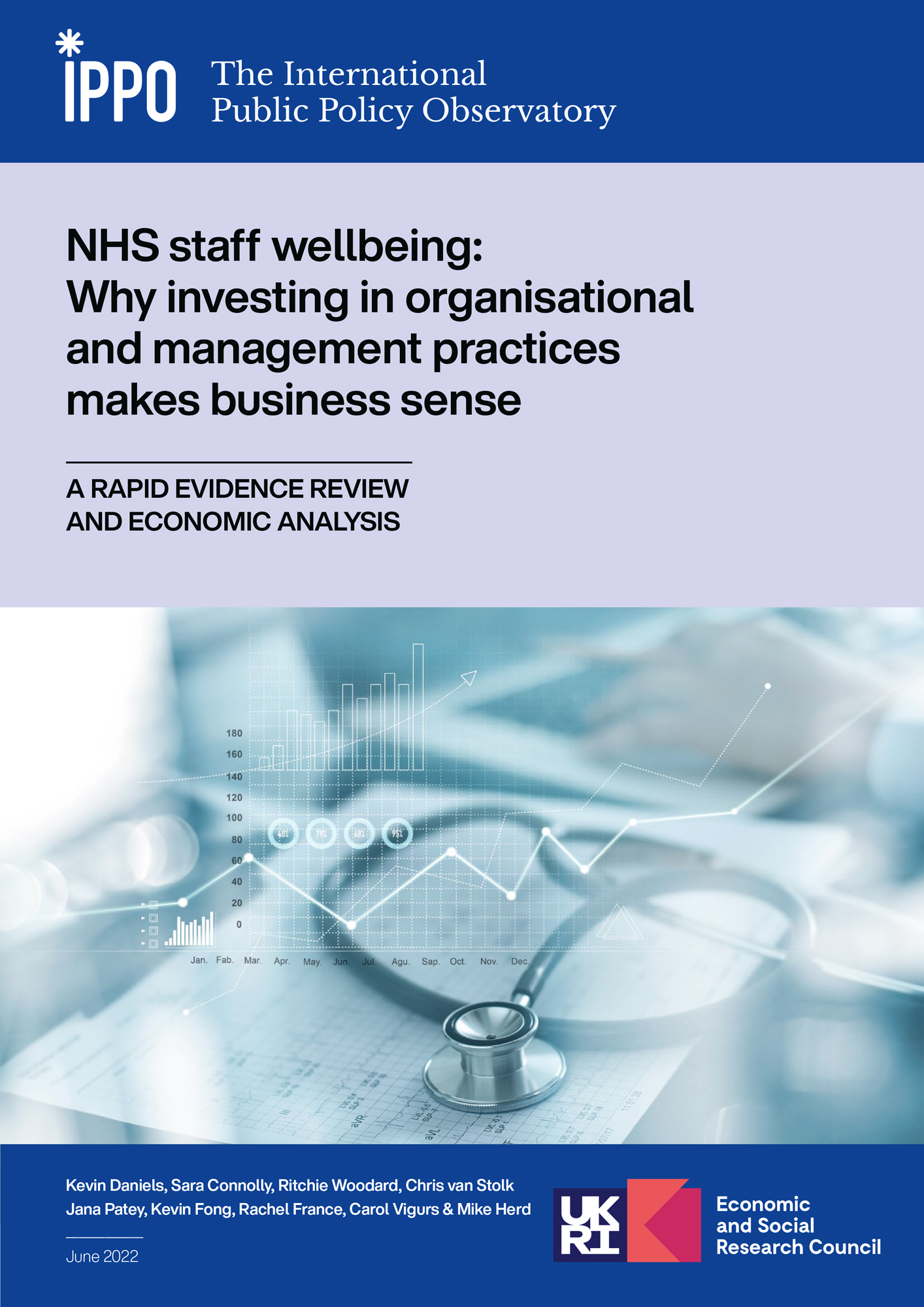Rapid Evidence Review and Economic Analysis: NHS Staff Wellbeing and Mental Health


This is a summary of the findings of a rapid evidence review and economic analysis commissioned by The International Public Policy Observatory (IPPO) to advise policymakers on how to improve NHS staff wellbeing.
Analysis by IPPO, The University of East Anglia and RAND Europe estimates the cost of poor mental health and wellbeing to the NHS might amount to £12.1 billion per year.
Click here to read the full report and here to watch the video of the launch event on June 17, 2022, with guest speakers Dr Steve Boorman CBE, director of employee health at consultancy Empactis and author of the landmark ‘Boorman’ report, and Professor Dame Carol Black, co-chair of NHS England/Improvement’s Expert Advisory Group on Employee Health and Wellbeing.
Key Recommendations
- The NHS should act on the recommendations of this and previous reviews and make the protection and promotion of staff wellbeing central to the operational culture of the NHS.
- Systemic and sustained changes in organisational culture are required. The NHS should invest at the level of similar large ‘good practice’ employers in the wellbeing of its workforce.
Introduction
The pandemic has demanded an extraordinary response from NHS staff resulting in increased strain and workload intensity while highlighting their vital role as key workers. It has emphasised the issue of staff wellbeing and created an opportunity for meaningful change.
Poor mental health and wellbeing, staff shortages and high vacancy rates across the NHS pre-date the pandemic.
The service is now in a state of genuine crisis with long waiting lists and ambulance response times, as well as large numbers of staff resignations. Staff wellbeing seems to have been regarded as secondary to the operational goals of the NHS rather than of central importance. This report sets out the business case for investment.
What did we find out?
- Mental health is deteriorating with 47% of NHS staff reporting feeling unwell as a result of work-related stress in the previous twelve months (data collected between September and November 2021).
- The overall sickness absence rate for NHS staff in England has increased to 5.7% in October 2021 and presenteeism (staff working while in suboptimal health and wellbeing) is likely to have a much more significant impact on overall productivity in the NHS.
- There are high vacancy rates and high turnover rates.
- Several studies show that poor NHS staff health and wellbeing are associated with a range of outcomes including reduced quality of care, financial performance, and patient satisfaction.
What is the cost of poor mental health and wellbeing to the NHS?
- We estimate the cost of poor mental health and wellbeing to the NHS as at least £12.1 billion a year.
- By tackling poor mental health and wellbeing and reducing the number of people voluntarily leaving the NHS could save up to £1 billion under some of the scenarios modelled.
Interventions that work…
- Changing how working schedules are managed has a positive effect on staff wellbeing.
- Improved physical environments aids wellbeing.
- Systemic changes that include leadership development can help wellbeing
- Improved social support, automating processes and virtual working can have positive effects on wellbeing, at least for some people.
- However, despite the size of the problem, there is surprisingly little evidence on how to tackle the problem at scale or on implementation. Interventions are likely to be most effective as part of a health and wellbeing programme.
Higher level interventions…
- Put protection of NHS staff health at the core of operational plans, governance, and strategies. For example, as part of the NHS People Plan, the NHS Long Term Plan and the NHS Five Year Forward View.
- Make staff wellbeing a core focus in inspections and reviews by regulators such as the Care Quality Commission, the General Medical Council and the Nursing and Midwifery Council.
- Improve NHS governance principles as applied to the wellbeing of NHS staff, such that accountability for the health of the NHS workforce is clearly defined and well understood.
- In addition to the NHS Staff Survey there is a need for shorter, more frequent and operationally focused tools to monitor the wellbeing and mental health of staff on a regular basis. Here the NHS should follow the example of other organisations – notably the British military – which conduct longitudinal monitoring of personnel, through an agency funded by, but independent of, the military itself.
Conclusion: We need to spend money to save money
- Sustained, ring-fenced investment at scale is required to reduce costs in the long term.
- Money saved should be spent on more staff to help reduce the burden of poor wellbeing on the NHS.
- More research is needed into which interventions work at scale in healthcare settings in the UK.
- The research base on the cost-benefits of what works also needs to be developed.
Tools for Practitioners
This toolkit of free, evidence-informed workplace wellbeing resources draws upon cutting edge research, and insider insights so that you can take action to help your business evolve and thrive.
